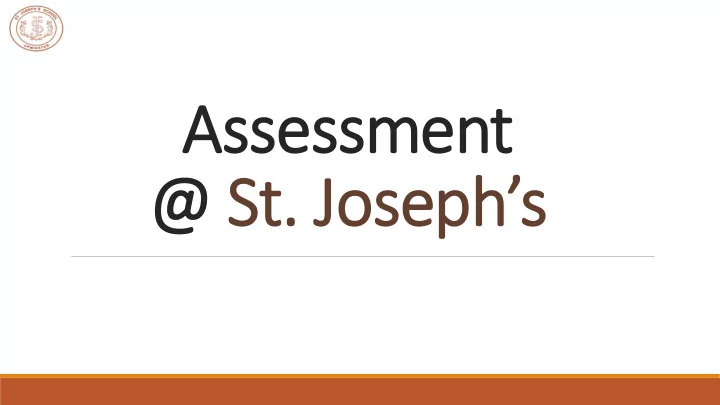

Assessment @ @ St. Joseph’s
❖ Since September 2014, schools have been teaching the new curriculum, based on the National Curriculum which all schools are required to teach. ❖ Just as the curriculum changed, assessment changed too. Years 2 and 6 were the last year groups to achieve the graded ‘levels’ at the end of an academic year in 2015. They, like all year groups, are now being assessed using the new system.
What is the new system? ❖ The government removed descriptions of levels from the National Curriculum and schools are now expected to establish their own assessment systems. ❖ At St Joseph’s we use a system of ‘bands’ to measure children’s attainment and progress.
Why the change? ❖ The Department for Education felt that levels were too vague and complicated for parents and not good at helping them understand their child’s progress ❖ There were also concerns that the levels system could contribute to children developing a "fixed mindset" about their ability and potential for growth.
So how are children now assessed? ❖ We teach the curriculum for the year group that the child is in. If your child is not yet ready to access that curriculum, they will continue to work on the curriculum for the year group that they can access. ❖ As the new curriculum is more challenging, children who are secure in their age band do not move on to the objectives for the next year group. Instead, they are expected to gain a more rounded knowledge of the curriculum and study objectives in ‘greater depth’. ❖ We assess children constantly through our observations, marking and feedback and discussions. ❖ Formal assessments occur each half term and these inform the teachers’ judgements. ❖ Children’s attainment is recorded each half term through SIMS ❖ Pupil Progress meetings take place each term so that progress can be monitored ❖ At your parent consultation evening, you will be informed about whether your child is ‘working towards’, ‘working at’ or ‘working above’ the expectations for their age band within Reading, Writing and Mathematics.
STATUTORY ASSESSMENT IN PRIMARY SCHOOLS ❖ Early Years Foundation Stage Profile ❖ Year 1 Phonics Check ❖ End of Key Stage 1 ❖ End of Key Stage 2
Do we use anything else to aid assessment in school? ❖ Termly pupil progress meetings and class commentaries ❖ Pupil target sheets ❖ Marking, feedback and pupil response (‘Fix - it’ Time) ❖ The ‘Big Write’ ❖ Traffic lighting and self/peer assessment
“The community of St. Joseph’s School follows the example of Christ, accepting and respecting everyone as we learn and grow together, safe in His love.”
Recommend
More recommend